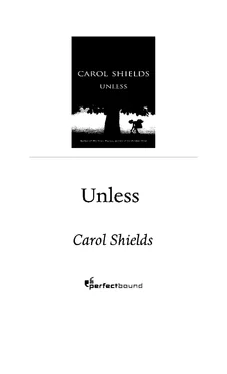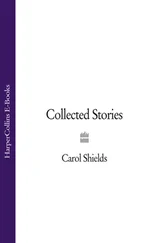Carol Shields - Unless
Здесь есть возможность читать онлайн «Carol Shields - Unless» — ознакомительный отрывок электронной книги совершенно бесплатно, а после прочтения отрывка купить полную версию. В некоторых случаях можно слушать аудио, скачать через торрент в формате fb2 и присутствует краткое содержание. Жанр: Современная проза, на английском языке. Описание произведения, (предисловие) а так же отзывы посетителей доступны на портале библиотеки ЛибКат.
- Название:Unless
- Автор:
- Жанр:
- Год:неизвестен
- ISBN:нет данных
- Рейтинг книги:4 / 5. Голосов: 1
-
Избранное:Добавить в избранное
- Отзывы:
-
Ваша оценка:
- 80
- 1
- 2
- 3
- 4
- 5
Unless: краткое содержание, описание и аннотация
Предлагаем к чтению аннотацию, описание, краткое содержание или предисловие (зависит от того, что написал сам автор книги «Unless»). Если вы не нашли необходимую информацию о книге — напишите в комментариях, мы постараемся отыскать её.
Unless — читать онлайн ознакомительный отрывок
Ниже представлен текст книги, разбитый по страницам. Система сохранения места последней прочитанной страницы, позволяет с удобством читать онлайн бесплатно книгу «Unless», без необходимости каждый раз заново искать на чём Вы остановились. Поставьте закладку, и сможете в любой момент перейти на страницу, на которой закончили чтение.
Интервал:
Закладка:
“And why is it,” Lynn went on, “that I’m not afraid of riding my bike down Borden Road and turning on to Main Street? I’ve got my helmet on and I’m trying to keep way over on the margin of the road, but what if a driver suddenly decides to go into road rage and ram straight into me?”
“I don’t think there’s that much road rage in Orangetown at this hour,” I said, remembering that I had left my own house unlocked.
“Don’t believe it,” Annette said. “There’s rage everywhere.”
“Someone could walk into this café right this minute brandishing a sword. I read about a man who went into a church in England and started slicing up people.”
“He was insane.”
“It could never have been predicted.”
“Like being struck by lightning. You can’t go around worrying about lightning.”
“Or planes crashing into your house.”
“If someone came in here with a sword,” Lynn said coolly, “we wouldn’t have a chance.”
“We’d be helpless.”
“We could duck under the table.”
“No, we’d be helpless.”
“Trust. We’ve had it drilled into us at birth. Or rather, we emerge from the womb already trusting. Trusting the hand that’s about to hold us.”
“So?” Lynn said. “When are we disabused of this notion?”
“When does doubt cut in, you mean?” “Immediately,” I said. “One second after birth. I’m sure of it.”
So, the days go by, early fall, middle fall. Natalie and Chris both got small parts in The Pajama Game that the high school is putting on, and at home they’re always bursting into Pajama Game songs, which, after all these years, are still good songs. “Hernando’s Hideaway,” “Seven and a Half Cents.” I’ve got ssss-steam heat. That’s Natalie’s favourite; she belts it out, descending the stairs as she sings, going from one side to another, leaning over the banister, stretching her arms wide; Chris, just behind her on the stairs, chants a subtle boom-de-boom in accompaniment. Tom is writing a paper for the trilobite conference next year in Estonia. “Wouldn’t you like to go to Estonia?” he asks me. I don’t know. It depends on Norah, what happens to Norah. I’m trying to work on my new novel but am often derailed.
Danielle’s new book is selling well even without an author tour, even with minimal promotion. So it goes.
Otherwise
Two years ago I inhabited another kind of life in which I scarcely registered my notion of heartbreak. Hurt feelings, minor slights, minimal losses, small treacheries, even bad reviews — that’s what I thought sadness was made of: tragedy was someone not liking my book.
I wrote a novel for no particular reason other than feeling it was the right time in my life to write a novel. My publisher sent me on a four-city book tour: Toronto, New York, Washington, and Baltimore. A very modest bit of promotion, you might say, but Scribano & Lawrence scarcely knew what to do with me. I had never written a novel before. I was a woman in her forties, not at all remarkable looking and certainly not media-smart. If I had any reputation at all it was for being an editor and scholar, and not for producing, to everyone’s amazement, a “fresh, bright, springtime piece of fiction,” or so it was described in Publishers Weekly.
My Thyme Is Up baffled everyone with its sparky sales. We had no idea who was walking into bookstores and buying it. I didn’t know and Mr. Scribano didn’t know. “Probably young working girls,” he ventured, “gnawed by loneliness and insecurity.”
These words hurt my feelings slightly, but then the reviews, good as they were, had subtly injured me too. The reviewers seemed taken aback that my slim novel (200 pages exactly) possessed any weight at all. “Oddly appealing,” the New York Times Book Review said. “Mrs.
Winters’s book is very much for the moment, though certainly not for the ages,” The New Yorker opined. Tom advised me to take this as praise, his position being that all worthy novels pay close attention to the time in which they are suspended, and sometimes, years later, despite themselves, acquire a permanent lustre. I wasn’t so sure. As a long-time editor of Danielle Westerman’s work, I had acquired a near-crippling degree of critical appreciation for the severity of her moral stance, and I understood perfectly well that there was something just a little bit darling about my own book.
My three daughters were happy about the book because they were mentioned by name in a People Magazine interview. (“Mrs. Winters lives on a farm outside Orangetown, Ontario, is married to a family physician, and is the mother of three handsome daughters, Natalie, Christine, and Norah.”) That was enough for them. Handsome! Norah, the most literary, the most mercurial of the three — both Natalie and Chris are in the advanced science stream at Orangetown High School — mumbled that it might have been a better book if I’d skipped the happy ending, if Alicia had decided on going to Paris after all, and if Roman had denied her his affection. There was, my daughter postulated, maybe too much over-the-top sweetness in the thyme seeds Alicia planted in her window box, and in Alicia’s listless moods and squeaky hopes. And no one in her right mind would sing out (as Alicia had done) those words that reached Roman’s ears — he was making filtered coffee in the kitchen — and bound him to her forever: “My thyme is up.”
It won the Offenden Prize, which, though the money was nice, shackled the book to minor status. Clarence and Margot Offenden had established the prize back in the seventies out of a shared exasperation with the opaqueness of the contemporary novel. “The Offenden Prize recognizes literary quality and honours accessibility.” These are their criteria. Margot and Clarence are a good-hearted couple, and rich, but a little jolly and simple in their judgments, and Margot in particular is fond of repeating her recipe for enduring fiction. “A beginning, a middle, and an ending,” she likes to say. “Is that too much to ask?”
At the award ceremony in New York she embraced Tom and the girls and told them how I shone among my peers, those dabblers in convolution and pretension who wrote without holding the reader in mind, who played games for their own selfish amusement, and who threw a mask of noir over every event, whether it was appropriate or not, who put a doorway, say, or a chair in every chapter, just to be baffling and obscure. “It’s heaven,” Margot sang into Tom’s ear, “to find that sunniness still exists in the world.” I was interviewed for television, sitting in a Vasily chair with a cat on my lap; someone, the director or producer, had insisted on the cat. Something to do with image.
I don’t consider myself a sunny person. In fact, if I prayed, I would ask every day to be spared the shame of dumb sunniness. Danielle Westerman, her life, her reflection on that life, has taught me that much. Don’t hide your dark side from yourself, she said to me once, it’s what keeps us going forward, that pushing away from the blinding brilliance. She said that, of course, in the tough early days of feminism, and no one expected her to struggle free to merriment. I remember that I did feel, starting my mini-tour, the resident anxiety you develop when you know you’ve been too lucky; at any moment, maybe next Tuesday afternoon, I would be stricken with something unbearable.
After the New York event, I said goodbye to the family and got on a train and travelled to Washington, staying in a Georgetown hotel, which had on its top floor, reserved for me by my publisher, something called the Writer’s Suite. A brass plaque on the door announced this astonishing fact. I, the writer in a beige raincoat, Ms. Reta Winters from Orangetown, entered this doorway with small suitcase in tow and looked around, not daring to imagine what she might find. There was a salon as well as a bedroom, two full baths, a very wide bed, more sofas than I would have time to sit on in my short stay, and a coffee table consisting of a sheet of glass posed on three immense faux books stacked one on the other. A large bookshelf held the tomes of the authors who had stayed in the suite. “We like to ask our guests to contribute a copy of their work,” the desk clerk had told me, and I was obliged to explain that I had only a single reading copy with me but that I would attempt to find a copy in a local store. “That would be most appreciated,” she said with deep sincerity.
Читать дальшеИнтервал:
Закладка:
Похожие книги на «Unless»
Представляем Вашему вниманию похожие книги на «Unless» списком для выбора. Мы отобрали схожую по названию и смыслу литературу в надежде предоставить читателям больше вариантов отыскать новые, интересные, ещё непрочитанные произведения.
Обсуждение, отзывы о книге «Unless» и просто собственные мнения читателей. Оставьте ваши комментарии, напишите, что Вы думаете о произведении, его смысле или главных героях. Укажите что конкретно понравилось, а что нет, и почему Вы так считаете.












